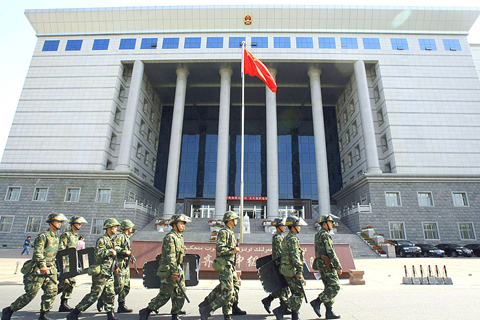A court in Xinjiang has tried and sentenced three suspects accused of joining in an outburst of needle-stabbing that ignited sometimes deadly riots and deepened ethnic divisions in the tense frontier region.
The Intermediate Court of Urumqi yesterday announced jail sentences of up to 15 years against the suspects — the first to appear before a judge over the scare — the Xinhua news agency reported.
Muhutaerjiang Turdi, a 34-year-old man, and Aimannisha Guli, a 22-year-old woman, were jailed for 10 years and seven years respectively. They were accused of using a syringe to threaten a taxi driver into giving them 710 yuan (US$103), Xinhua reported.

PHOTO: REUTERS
In a separate trial in the same court, Yilipan Yilihamu, 19, was sentenced to 15 years on a charge of “spreading false dangerous substances.”
He was accused of jabbing a woman with a pin while she bought fruit at a stall, Xinhua said.
The report said the defendants were Uighurs.
Urumqi has been struggling to return to order after panic and protests over claims that Uighurs used syringes to attack residents, especially members of China’s Han ethnic Chinese majority, who many Uighurs see as an unwelcome and growing presence in the region.
TIBET
Meanwhile, a British minister underlined London’s support for greater Tibetan autonomy on an unprecedented visit to Lhasa last week.
Junior Foreign Office Minister Ivan Lewis visited China from Monday to Thursday and made the first ever trip to Tibet by a British government member, 18 months after an internationally criticized Chinese crackdown in Tibet.
“This is a historic visit,” the office quoted him as saying on Friday, adding that it was in the context of “our decision to change UK policy, and the significant international concern following the events in March 2008.”
“We recognise Tibet as an autonomous region of China ... But long-term stability can only be achieved through respect for human rights and greater autonomy,” the statement quote him as saying.
“This depends on substantive dialogue between the Chinese government and the representatives of the Dalai Lama,” he said.
In Tibet, Lewis met the chairman of the Tibet Autonomous Region and the Drepung Monastery.
Ahead of the visit, pro-Tibet campaigners urged Lewis to speak out against China’s rule of the Himalayan territory and human rights abuses there.

CHANGE OF MIND: The Chinese crew at first showed a willingness to cooperate, but later regretted that when the ship arrived at the port and refused to enter Togolese Republic-registered Chinese freighter Hong Tai (宏泰號) and its crew have been detained on suspicion of deliberately damaging a submarine cable connecting Taiwan proper and Penghu County, the Coast Guard Administration said in a statement yesterday. The case would be subject to a “national security-level investigation” by the Tainan District Prosecutors’ Office, it added. The administration said that it had been monitoring the ship since 7:10pm on Saturday when it appeared to be loitering in waters about 6 nautical miles (11km) northwest of Tainan’s Chiang Chun Fishing Port, adding that the ship’s location was about 0.5 nautical miles north of the No.

A Chinese freighter that allegedly snapped an undersea cable linking Taiwan proper to Penghu County is suspected of being owned by a Chinese state-run company and had docked at the ports of Kaohsiung and Keelung for three months using different names. On Tuesday last week, the Togo-flagged freighter Hong Tai 58 (宏泰58號) and its Chinese crew were detained after the Taipei-Penghu No. 3 submarine cable was severed. When the Coast Guard Administration (CGA) first attempted to detain the ship on grounds of possible sabotage, its crew said the ship’s name was Hong Tai 168, although the Automatic Identification System (AIS)

An Akizuki-class destroyer last month made the first-ever solo transit of a Japan Maritime Self-Defense Force ship through the Taiwan Strait, Japanese government officials with knowledge of the matter said yesterday. The JS Akizuki carried out a north-to-south transit through the Taiwan Strait on Feb. 5 as it sailed to the South China Sea to participate in a joint exercise with US, Australian and Philippine forces that day. The Japanese destroyer JS Sazanami in September last year made the Japan Maritime Self-Defense Force’s first-ever transit through the Taiwan Strait, but it was joined by vessels from New Zealand and Australia,

COORDINATION, ASSURANCE: Separately, representatives reintroduced a bill that asks the state department to review guidelines on how the US engages with Taiwan US senators on Tuesday introduced the Taiwan travel and tourism coordination act, which they said would bolster bilateral travel and cooperation. The bill, proposed by US senators Marsha Blackburn and Brian Schatz, seeks to establish “robust security screenings for those traveling to the US from Asia, open new markets for American industry, and strengthen the economic partnership between the US and Taiwan,” they said in a statement. “Travel and tourism play a crucial role in a nation’s economic security,” but Taiwan faces “pressure and coercion from the Chinese Communist Party [CCP]” in this sector, the statement said. As Taiwan is a “vital trading